11 alternatives to alcohol that you'll actually want to drink instead
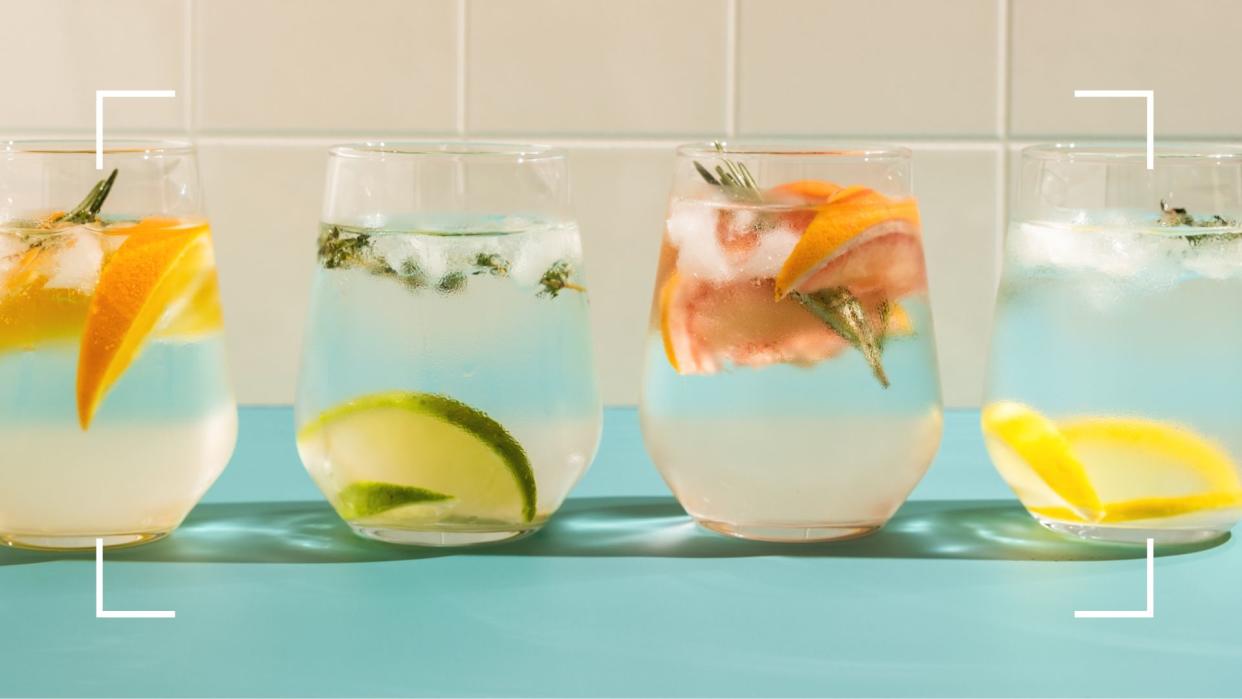
Having one of the tastiest alternatives to alcohol on hand can really help you out, whether you're looking to take on Sober October or just cut down your intake. From classics like flavoured sparkling water to new adaptogenic blends that can produce the same relaxing effect as your favourite tipple, these are the ones you need to know about.
There are plenty of alternative activities to drinking, like exercise and meditation, that can help distract you from wanting a drink if settling down with a glass of wine is part of your normal routine. However, our list notes all the exciting alcohol substitutes for those who still fancy a beverage or need something to drink with friends, without any nasty effects the following day.
The benefits of not drinking alcohol are numerous but if everyone else around you is having a drink, you might feel a little left out. Luckily, there are plenty of delicious alternatives to alcohol to have instead, including tasty low-calorie non-alcoholic drinks in a can and options to order at the bar.
Alternatives to alcohol
1. Kombucha
Kombucha has been popular for a few years now as a good substitute for alcoholic drinks - and for good reason. This fermented green tea comes in various fruity flavours like ginger lemon, raspberry, and passionfruit, from brands like Remedy and Jarr. These are stocked on Amazon and in most grocery stores. Kombucha has the same sizzle as beer as well, without the tipsy feeling that comes after a few pints.
The benefits of kombucha are widely established too, so you'll be doing good for your body when you drink it, explains Pauline Cox MSc, a functional nutritionist and author of Hungry Woman. "These fermented drinks are often low in sugar and have the added benefits of live bacteria, also known as probiotics," she says. "Daily probiotics support diversity in the gut microbiome, which has been linked to longevity."
And a healthy gut microbiome can have all kinds of broader health benefits. For instance, recent studies have highlighted which foods can reduce stress, and fermented products, such as kombucha, are top of the list. "A healthy gut microbiome has been linked to improved mental wellbeing and neurological health, improved digestive health, and reduced inflammation" explains Cox, who is also the nutritionist advisor to Wiley's Finest sustainable supplements.
However, if you're wondering what happens when you give up alcohol and you're wondering kombucha, it's worth noting that you shouldn't have more than three servings per day.
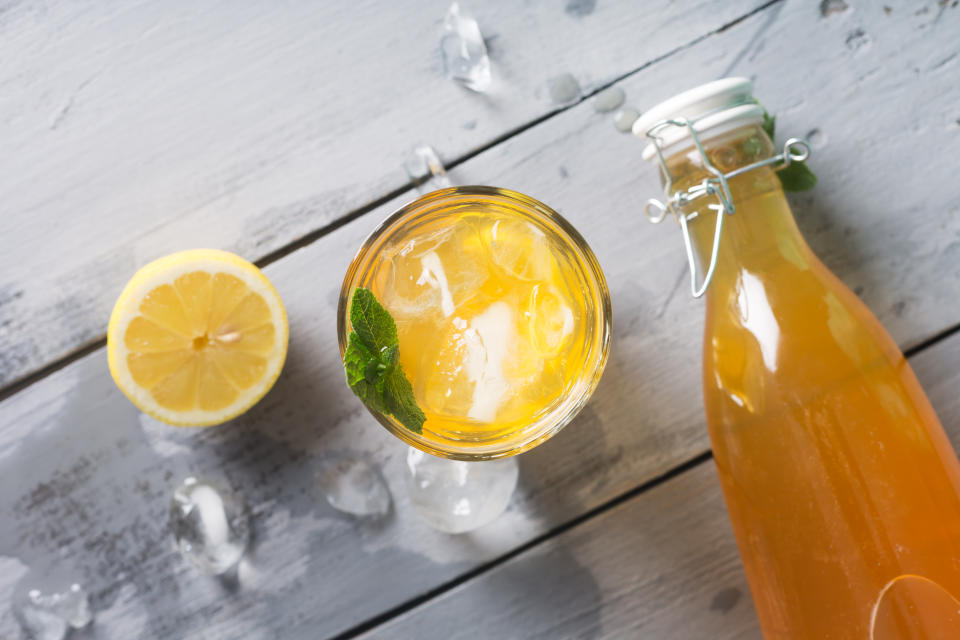
2. Ginger beer or ale
Ginger beer and ginger ale are two of the top low-calorie beer options to go for if you're looking to cut back or do more mindful drinking. Much like kombucha, ginger beer has a sizzle to the taste that lightly resembles beer and it looks much the same as lager too, so no one would notice the difference. Those who prefer a lighter taste and less fizz will likely want to go for a ginger ale, which has a slightly lighter appearance than regular ale.
Few studies have been conducted on these carbonated drinks specifically but there's plenty of research on ginger itself to suggest that making the switch could prove very beneficial for your health. For example, a study by Mashhad University of Medical Sciences suggests that ginger root contains compounds, such as shogaols and gingerols, which may help prevent inflammation and protect against cellular damage. In turn, this could help to support liver health and offer some protection against certain toxins, including alcohol if have it while drinking.
If you're looking to reap the associated health benefits of ginger, opt for an organic ginger beer or ale, as this is likely to have more ginger in the recipe. Check out the selection from Whole Foods when you're next in the store or shop the range at Belvoir Farms if you prefer to buy online.
3. Mocktails
Mocktails, or non-alcoholic cocktails as they're otherwise known, are one of the best alternatives to alcohol if you're drinking in a bar. Most places will offer alcohol-free alternatives to some of the most famous cocktail recipes, with the most common ones being simple swaps on the Mojito, Lemon Drop, and Bloody Mary (it's often called the Virgin Mary), and classics like a Shirley Temple.
However, Cox warns, there does tend to be a lot of sugar in these types of alcohol alternatives as they often use fruit juice. "The fructose in a carton of fruit juice or soft drink is used by the body in exactly the same way as alcohol is," she explains. "Sweet, fizzy drinks are high in glucose, sucrose, and fructose and disrupt our hunger signaling and blood sugars. This causes insulin resistance and fatty livers, thereby reducing our ability to access fat-soluble nutrients and detoxify. Sugar is also highly addictive as it lights up our reward center."
So as much as avoiding alcoholic cocktails is easy in a bar, restaurant, or at home, be sure to check the ingredients before ordering if you're concerned about having sugar cravings down the line.
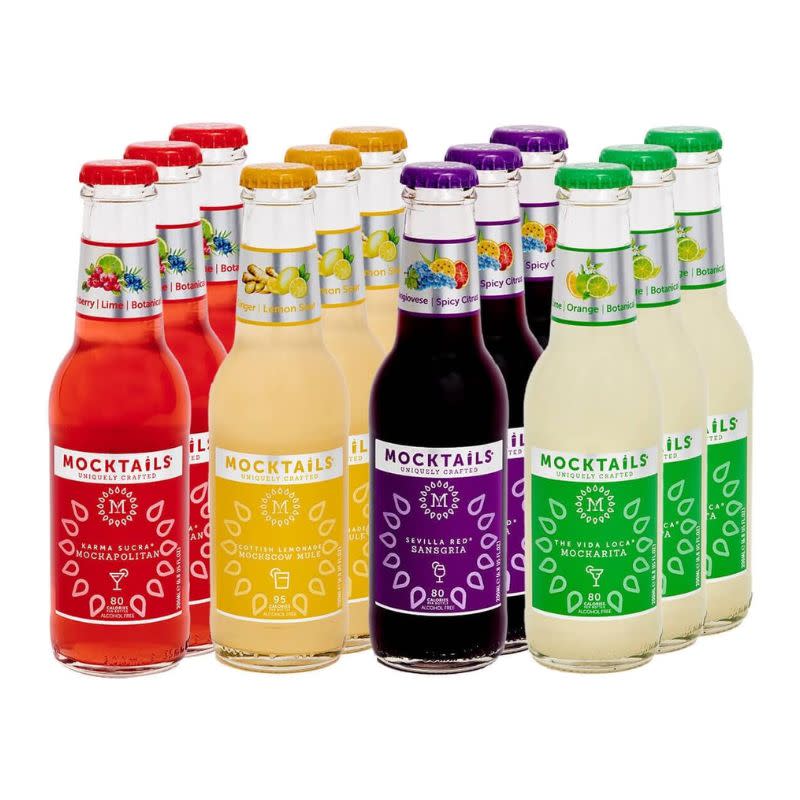
Mocktails Non-Alcoholic Cocktail Variety Pack - £29.99
Available to buy on Amazon, these Mocktails come in all kinds of flavors so you don't have to compromise on your favorite flavors. Includes popular drinks like Mockscow Mule, Mockarita, Mockapolitan, and Sansgria. View Deal
4. Matcha tea
If you look to alcohol to relax your mind, Matcha tea could be the best pick for you in our list of alcohol substitutes, as it contains L-theanine. “This compound increases GABA, a relaxation neurotransmitter, which is also released when you drink alcohol. Some companies have even started adding it to soft drinks,” says Cox. If you're a fan of cocktails with a slightly more savory taste then this could be the pickup you need to ditch drinking.
Traditionally, Matcha tea is made from green tea leaves that have been stone-ground into a soft powder by hand. This is sifted and whisked with a specialist tool with hot water to make the beverage. However, as the drink has become more popular over the years, everyone has started selling it in all its forms. Stop by your local coffee shop and you'll it as one of the suggested healthy alternatives to coffee as it also contains naturally-occurring caffeine. In grocery stores, you can find Matcha tea sold in bottles and cans in the takeaway section. Or, you can buy traditional supplies online relatively affordably.
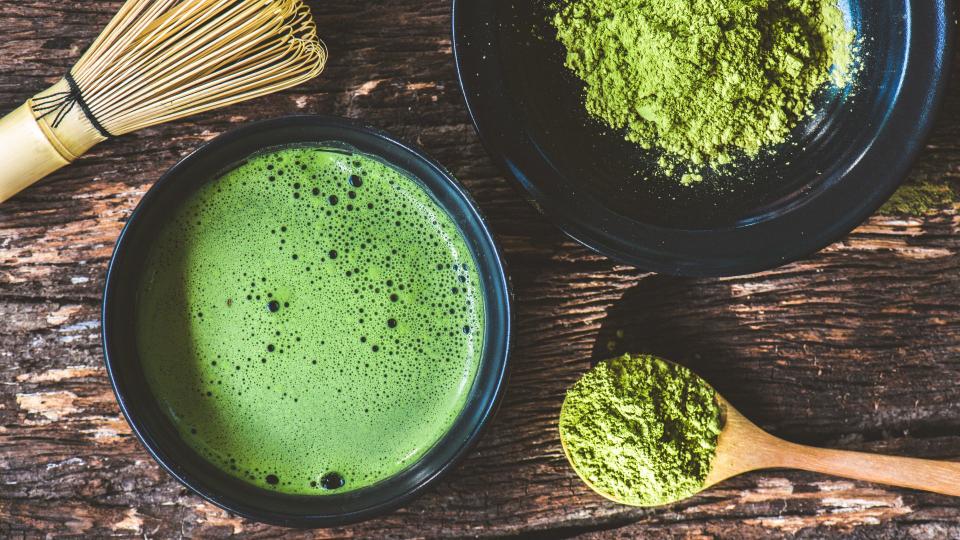
5. Sparkling water with a slice of fruit
Want to keep things simple? There's nothing wrong with a glass of water, says Rachel Clarkson, a Doctify-reviewed dietician and nutritionist. But make it sparkling to keep things interesting.
"Alternating between alcoholic and non-alcohol beverages [or switching to non-alcoholic beverages for an evening], will slow you down and could easily cut your intake by half," says Clarkson, who is also the founder of The DNA Dietitian. "A zero-calorie soda or sparkling water with a slice of grapefruit is so delicious and a glass of water with ice and lime will also do the trick and keep you hydrated."
5. Coconut water
Coconut water is often listed as one of the ways to prevent a hangover after a night of drinking as it's so hydrating and contains key minerals like calcium and potassium, but this is also what makes it a great substitute. It's also completely sugar-free, so you won't have to worry about that - just be sure to opt for pure coconut water and always read the label.
For those who love a tropical cocktail, it's a great choice. We suggest serving this fruity drink with a couple of ice cubes and frozen berries for an extra vitamin hit.
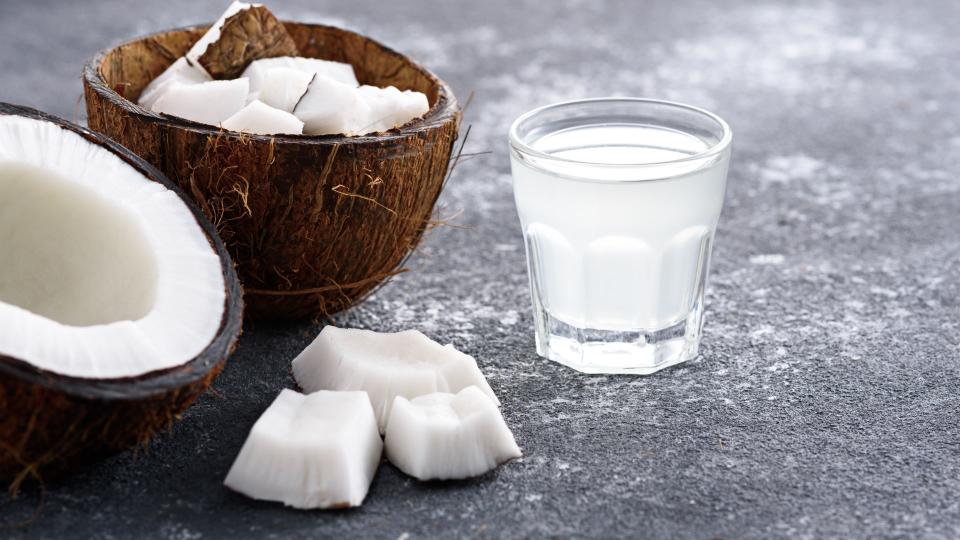
6. Adaptogen blends
Much like Matcha tea, adaptogens like reishi mushroom, lemon balm, and passionflower can be wonderful alternatives to alcohol thanks to the relaxing effect they have on the body. "Compounds such as adaptogens can aid in relaxation and switch us from fight or flight to rest and digest," explains Cox. They can taste a little earthy so they'll be best suited for those who don't mind strong favors and prefer drinking cocktails, as these blends can be mixed with water or juice to form another version of a healthy mocktail.
If you're looking to explore adaptogen foods for yourself and you enjoy coffee as a good substitute for an alcoholic drink, you can slip these wonder blends into your routine easily with sachets from London Nootropics in various forms. Otherwise, you can find adaptogen powders that mix well from the likes of DIRTEA and Four Sigmatic on Amazon.
7. Herbal tea
Most of us, if we're going to have an alcoholic drink, tend to have one in the evenings. With delicious blends available from your local grocery store for much less than a bottle of wine, it's another great option.
Plus, if alcohol stops you from heading to bed for the best time to sleep, herbal teas can offer a helping hand. Many of the blends contain chamomille, which was proven to help participants sleep better in a study by the University of Michigan.
8. Alcohol-free beers and spirits
The drinks market might not be quite there with alcohol-free red wine but the no- and low-alcohol drinks market is set to be worth an impressive $68.9 billion by the end of the decade, so it's fair to say there are still plenty of choices. And this is about as close to healthy alcohol as we can get for now.
"Alcohol-free beers and spirits are great options, especially if you feel peer pressure when you're out socially. There's such a wide selection, which means you can always have fun with an exciting non-alcoholic drink option," says Ruari Fairbairns, founder of One Year No Beer. "If you go alcohol-free and change your drinking options to plain water, you're always going to feel like not drinking is boring. So, use fun alcohol-free drinks in the beginning to gain the psychological benefit of drinking but without the booze."
For alcohol-free beers, we recommend Lucky Saint and Days. While alcohol-free spirits tend to be on the more expensive end, despite containing no alcohol, Seedlip's selection of non-alcoholic gins and low-calorie vodka is occasionally on sale. Ish Spirits does a great collection of alcohol-free tequila, rum, and cocktails. And for more insight into the world of alcohol-free drinks, plus some recipes to make yourself at home, check out some of the best quit lit books and audioguides.

Lucky Saint Alcohol-Free Beer - £46
With 53 calories per bottle and 0.5% alcohol, Lucky Saint is our favourite when it comes to alcohol-free beers. View Deal
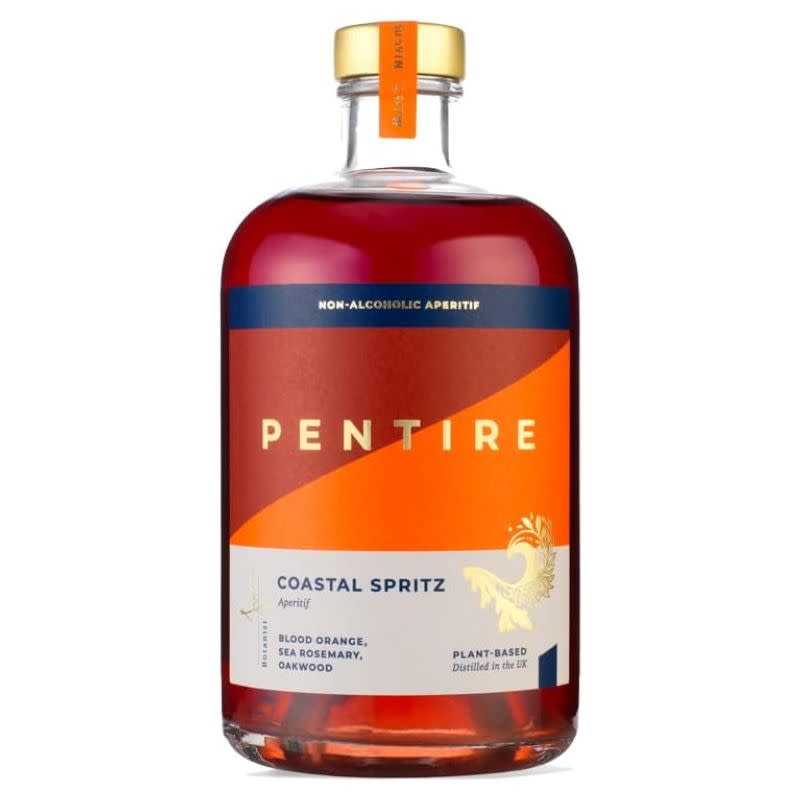
Pentire Coastal Spritz - £22.80
While Aperol season might be done and dusted, the Pentire Coastal Spritz is a refreshingly zesty (alcohol-free) tipple all year round. Just combine with tonic for the perfect mixture. View Deal
9. Drinking vinegars
You may have never heard of these before, but drinking vinegars have been around since the Babylonian era. Since then, the drink has been served and made in a number of different ways. Known for their amazing digestion benefits, they're great for those trying to achieve a healthier gut.
It's not all health benefits though, many brands sell the beverage with a fruit twist which makes the alcohol alternative a perfectly refreshing drink on warm days. The Wasabi Company offer a number of flavored drinking kinds of vinegar which they suggest mixing with sparkling water and fruit. When poured into a glass with garnish and ice you won't feel like you're missing out.
10. De-alcoholized wine
If you're looking to cut down on your drinking but still want to be able to pop open a bottle of low-alcohol wine on occasion or with dinner then de-alcoholized options are a great alternative to your usual tipple.
The beverage is made similarly to how regular wine is. The only difference is that after the usual fermentation process most, if not all, of the alcohol is removed. Everything else stays as it is, which is why it still holds its flavor, body, and color.
The proven health benefits of red wine can also be found in its non-alcoholic counterpart as the only ingredient being removed is the ethanol. So not only is this substitute healthier for you it will also mean no pesky hangovers or headaches the day afterwards.
Another great advantage to this de-alcoholized is that it's sold in most major supermarkets and is impressively affordable too. So you don't have to go to great lengths to get your hands on a bottle.
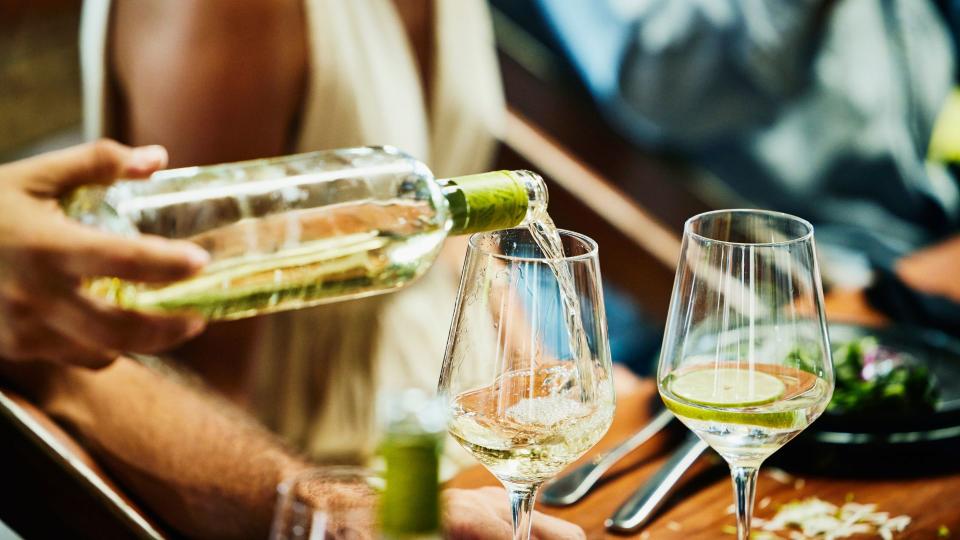
11. Fruit-infused water
There is growing hype around fruit-infused water and we totally get why. They are the perfect low-calorie and low-sugar swap for those sweet alcoholic drinks. Many brands are hopping onto the trend and releasing various flavors with added electrolytes, which help you stay properly hydrated.
We recommend brands such as DASH for delicious canned versions that are perfect on the go. Otherwise, tea companies such as Twinnings sell cold water-infusion tea bags which are affordable and great for at-home use. There are only advantages to fruit-infused waters as they're brilliant for hydration and losing weight since many contain some of the best fruit for weight loss. And of course, they taste great too.
Cox is quick to stress the advantages of hydration when it comes to alcohol alternatives. "Having alternatives to alcohol will give your liver a break and hydrating drinks are always a good option for this. The body's organs, including the liver, function best when they are hydrated."

DASH Water Mixed Pack - £18.99
Zero calories and zero alcohol, DASH's mixed pack contains 4 lemon, 4 raspberry, 4 blackcurrant, and 4 peach-flavored drinks, all made with low-wastage wonky fruit and veg for flavor. View Deal
What can I replace alcohol with to relax?
If you're looking to relax, research from the University of Chicago shows that activities like cardiovascular exercise and strength training can be incredibly useful. Exercise alleviates stress by inhibiting the production of typical stress hormones like cortisol and adrenaline and offering a positive shot of endorphins instead.
It's perfectly normal if you turn to a glass of wine to relax after a long day though, research from an ICM poll shows that two in three of us do it. It's all about finding those alternatives to alcohol to kick the habit, whether that be going out for a run or making a calming herbal tea instead.
And for those who worry about having fun without alcohol, Fairbairns has some advice. "For those people who find going to the pub and socializing the fun part, what they’re trying to get is that sense of connection with friends. As we know, alcohol releases dopamine, but so does socialize, so we get a double dopamine hit when we are out at the pub drinking with friends. If you want to counteract that, then the way to get a double dopamine hit is to hang out with friends by exercising together. A perfect example would be to try something new and go climbing with your social circle on a Friday evening, for example," Fairbairns continues."It’s an adrenaline rush, fun, exciting, and you get to connect with your friends, all without drinking."
Can CBD replace alcohol?
CBD can give you the same sense of relaxation we get from alcohol without any chance of a hangover. However, it's not for everyone. "CBD is not an alcohol replacement I would recommend," says Cox. She suggests adaptogens instead, which include compounds like ashwagandha, which can have the same relaxing effect.
How does stopping drinking improve your health?
There are endless advantages to limiting or totally stopping drinking, especially if you've previously been drinking alcohol every day. "It is now conclusive that drinking alcohol in any quantity is detrimental to health," says Michaela Weaver, a TED speaker and critically acclaimed women's alcohol coach, who has experienced firsthand the transformative effects saying goodbye to alcohol can have.
She says, "It’s a lesser known fact that drinking regularly causes many of the symptoms of stress, and this is the exact opposite of what we look for at the end of a day when wine o’clock rings out. If you want to feel calm and rested, stopping or minimizing alcohol is one of the quickest routes to have that in your life."
Excessive drinking can lead to various negative biological effects, such as weight gain, changes in appetite, fatigue, insomnia, decreased libido, and difficulty concentrating. Penny Weston, wellness expert and founder of MADE wellness center says, "Research has found that reducing or stopping your alcohol intake can lower blood pressure, lower blood sugar and can lessen your chances of liver disease, strokes, and some cancers."
Whether you decide to quit altogether or simply want to cut down on your alcohol intake it's clear there are endless beneficial reasons for both your health and now even your tastebuds.

